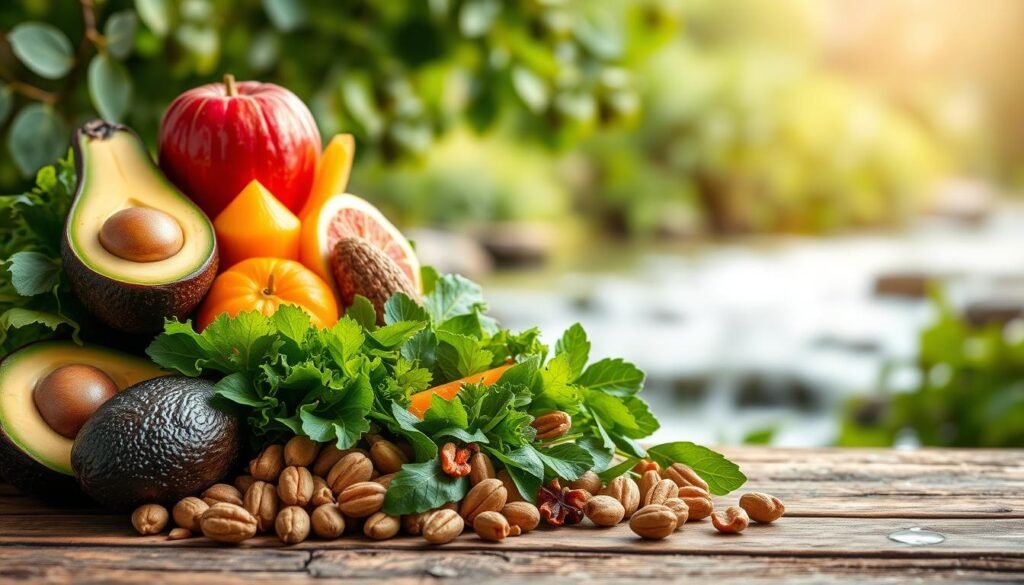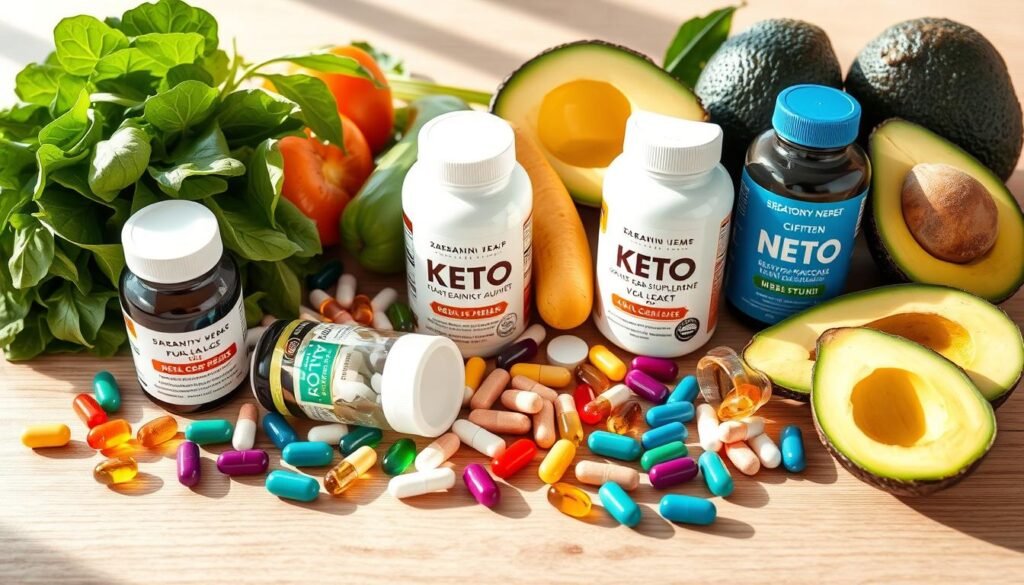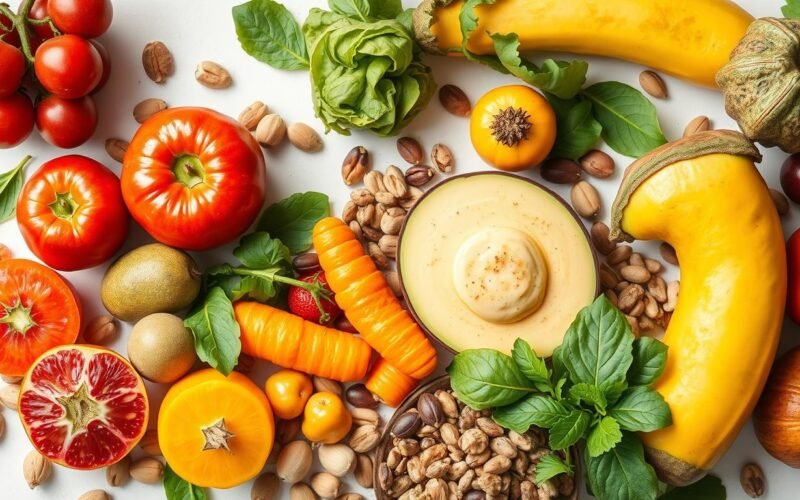Did you know 1 billion people worldwide lack Vitamin D? This is even more critical for women on a keto diet. The keto lifestyle changes your nutrient needs. It’s key to understand these changes for your health and success.
The keto diet does more than help you lose weight. It changes how you absorb and use vitamins and minerals. For example, it increases the loss of electrolytes like sodium and potassium. You’ll need to focus on getting these back to avoid fatigue and muscle cramps.
Women on keto have special nutritional needs. Women need 700 mcg of Vitamin A daily, while men need 900 mcg. Women also need 75 mg of Vitamin C daily, compared to 90 mg for men. These differences show why it’s important to tailor your diet to your needs as a woman on keto.
In this guide, we’ll look at the top five essential vitamins and minerals for women on keto. You’ll learn how to spot deficiencies, find keto-friendly foods, and when to use supplements. By the end, you’ll know how to optimize your nutrition and feel great while in ketosis.
Key Takeaways
- Vitamin D deficiency affects 1 billion people worldwide, making it a key concern for keto dieters
- The keto diet increases electrolyte excretion, requiring careful attention to sodium, potassium, and magnesium intake
- Women have different vitamin needs compared to men, necessitating a tailored approach to nutrition on keto
- Understanding the impact of carb restriction on micronutrient status is critical for keto success
- Proper supplementation strategies can help address nutrient gaps in a ketogenic diet
Understanding Nutrient Needs on a Ketogenic Diet
The ketogenic diet changes how your body gets energy. It uses 70-80% fat, 5-10% carbs, and 10-20% protein. This low-carb diet can lead to nutrient deficiencies if not planned well.
How Keto Affects Nutrient Requirements
On keto, you eat less than 50 grams of carbs, sometimes as low as 20 grams. This means you miss out on many foods rich in nutrients. You might not get enough B vitamins, calcium, iron, and magnesium.
Impact of Carb Restriction on Micronutrient Status
Carb restriction can harm your nutrient levels. A keto diet gives you only 6.4 grams of fiber a day, much less than the 28 grams you need. This can cause constipation and other digestive problems.
Why Women Need Special Attention to Nutrients on Keto
Women on keto have special challenges. Hormones and higher nutrient needs mean they must watch their diet closely. Studies show women lose less weight on keto than men, showing the need for a tailored approach.
| Nutrient | Importance for Women | Keto-Friendly Sources |
|---|---|---|
| Iron | Menstruation increases needs | Red meat, spinach |
| Calcium | Bone health | Full-fat dairy, canned sardines |
| B Vitamins | Energy production | Eggs, avocados |
Knowing these special nutrient needs helps women do well on keto. With careful planning and maybe supplements, you can meet your dietary needs. This ensures you stay healthy while following a high-fat, low-carb diet.
Essential Vitamins & Minerals for Women on Keto
Women on a ketogenic diet must watch their nutrient intake closely. The keto lifestyle can affect how your body absorbs and uses certain vitamins and minerals. It’s important to focus on key nutrients to keep your health in check and avoid deficiencies.
Electrolytes are key in your keto journey. Magnesium, potassium, and sodium help with energy and prevent the “keto flu.” Women need about 310 to 320 mg of magnesium every day, more on a high-protein keto diet.
Calcium is vital for strong bones. Women aged 19 to 50 need 1,000 mg daily, and those over 51 need about 1,200 mg. Finding keto-friendly calcium sources is important because many dairy products are high in carbs.
Iron is also critical, with women aged 19 to 50 needing 18 mg daily. Iron deficiency can weaken your immune system and lower energy, affecting your keto success.
- Vitamin D: 600 IU daily for adults 19-70
- B-complex vitamins: Support energy metabolism
- Omega-3 fatty acids: Help maintain a healthy omega-3 to omega-6 ratio
Don’t overlook fiber! Women need 25 grams daily. Even though the keto diet limits carbs to 20-50 grams per day, it’s important to include low-carb, high-fiber foods. This supports digestive health and reduces heart disease risk.
By focusing on these essential vitamins and minerals for women on keto, you can optimize your health and make the most of your ketogenic lifestyle.
Critical Electrolyte Balance for Keto Success
Keeping electrolyte balance right is key for women on keto. Your body changes how it uses fat, affecting mineral processing. We’ll look at why these minerals matter and how to keep them balanced.
Magnesium: The Vital Mineral
Magnesium is vital for over 300 body functions. On keto, you might need more to avoid deficiency. The FDA suggests 420 mg daily. Leafy greens and nuts are great keto sources.
Potassium Requirements
Potassium is vital for women on keto. It helps with fluid balance and muscle function. Aim for 4700 mg daily from leafy greens. It also boosts insulin sensitivity, helping your metabolism.
Sodium Needs During Ketosis
In ketosis, your body loses more sodium. The CDC says 2,300 mg daily is enough, but you might need more. Low sodium can cause fatigue, headaches, and muscle cramps. Adding salt to your meals helps keep electrolytes balanced.
Calcium for Bone Health
Calcium is essential for keto success. Women need at least 700 mg daily for bones. Include dairy or fortified non-dairy in your keto diet to meet calcium needs.
| Electrolyte | Daily Requirement | Keto-Friendly Sources |
|---|---|---|
| Magnesium | 420 mg | Spinach, almonds, avocado |
| Potassium | 4700 mg | Avocado, spinach, salmon |
| Sodium | 2300+ mg | Salt, bone broth, pickles |
| Calcium | 700+ mg | Cheese, sardines, kale |
By focusing on these minerals, you can avoid the “keto flu” and keep your body running well. Electrolyte balance is key to keto success and health.

Key Vitamins for Women’s Health in Ketosis
When you’re on a ketogenic diet, your body needs different nutrients. This is very important for women. The way your body absorbs vitamins changes, affecting your health.
Vitamin D and Absorption
Vitamin D is key for strong bones and hormone balance. On keto, your body might absorb it differently. Eating fatty fish and getting sunlight helps. If you’re not getting enough, you might need supplements.
B-Complex Vitamins
B vitamins help you have energy and feel good. Women on keto might feel tired during the start. Eating eggs, leafy greens, and nuts can help. These vitamins are important for low-carb diets.
Fat-Soluble Vitamins A, E, and K
Fat-soluble vitamins are important for many body functions. Keto’s high-fat diet can help your body absorb them better. Make sure to eat foods like avocados, nuts, and spinach.

| Vitamin | Function | Keto-Friendly Sources |
|---|---|---|
| Vitamin D | Bone health, hormone balance | Fatty fish, egg yolks, sunlight |
| B-Complex | Energy production, mood regulation | Eggs, leafy greens, nuts |
| Vitamin A | Eye health, immune function | Liver, butter, spinach |
| Vitamin E | Antioxidant protection | Almonds, avocados, olive oil |
| Vitamin K | Blood clotting, bone health | Kale, broccoli, cheese |
Optimal Food Sources for Keto Nutrients
It can be tough to get all the vitamins & minerals on a keto diet. The trick is to eat foods that are both low in carbs and packed with nutrients. Here are some top picks for keto-friendly foods for women.
Fatty fish like salmon and mackerel are great for omega-3 fats and vitamin D. Try to eat 3 ounces of them twice a week. Eggs are also a must, with no carbs and over 12 grams of protein in two large ones.
Leafy greens are essential for a keto diet. Spinach and kale are full of vitamin K and iron but very low in carbs. One bell pepper gives you 107% of your daily vitamin C.
Avocados are a keto dream. Half a medium avocado has just 1.5 grams of net carbs and 360 milligrams of potassium. They’re also good for your heart.
| Food | Net Carbs (per serving) | Key Nutrients |
|---|---|---|
| Almonds (1 oz) | 3g | Vitamin E, Magnesium |
| Blackberries (1/2 cup) | 3g | Vitamin C, Fiber |
| Cheddar Cheese (1 oz) | 1g | Calcium, Protein |
| Greek Yogurt (7 oz) | 8g | Protein, Probiotics |
Remember, variety is key. By mixing these nutrient-rich foods into your diet, you’ll get all the essential vitamins and minerals you need while staying in ketosis.
Support your health with our women’s hormonal balance guide and add recipes from keto collagen ideas.
Supplementation Strategies and Tips
It can be hard to get all the nutrients on a low-carb diet. Vitamin supplements are key for women on keto to cover nutritional gaps. We’ll look at when to use supplements and how to pick the best ones for your keto path.
When to Consider Supplements
If you’re tired or notice health changes, it might be time for keto-friendly multivitamins. Women on keto often need more iron, B vitamins, and vitamin D. For example, about 5 million Americans lack enough iron, with women needing 18 mg daily between 19-50.
Choosing Quality Supplements
Choose supplements made for low-carb diets. Look for products without added sugars and fillers. Good keto-friendly multivitamins should have magnesium, potassium, and B-complex vitamins.
Timing and Dosage Recommendations
Timing is key for supplement effectiveness. Take fat-soluble vitamins (A, D, E, K) with a meal that has healthy fats for better absorption. Space out calcium and iron supplements, as they can affect each other’s absorption. Always stick to recommended dosages and talk to a healthcare provider to tailor a plan for your keto lifestyle.
| Nutrient | Recommended Daily Intake | Best Time to Take |
|---|---|---|
| Iron | 18 mg (women 19-50) | Morning, with vitamin C |
| Vitamin D | 600-800 IU | With a fatty meal |
| B-complex | Varies | Morning, with food |
Conclusion
You now know the important vitamins and minerals for women on the keto diet. It’s vital to keep your nutrient levels balanced for a successful low-carb lifestyle. With 50% of American adults taking supplements, many of us aim to boost our health.
The keto diet can lead to nutrient deficiencies if not managed well. Focus on eating nutrient-dense foods and using supplements wisely. For example, getting enough folic acid is key, as the CDC suggests 400 micrograms daily for women of childbearing age.
Your body needs at least 30 essential vitamins and minerals it can’t make itself. On keto, pay extra attention to electrolytes like magnesium and potassium. Also, don’t forget fat-soluble vitamins A, D, E, and K – they’re important for your health and can be stored in your body.
Listen to your body and work with a healthcare professional to fine-tune your keto journey. With the right nutrient balance, you’ll thrive and reach your health goals. Keep this guide handy as you navigate the world of essential vitamins and minerals for women on keto.
FAQ
Why do women on keto need to pay special attention to vitamins and minerals?
What are the most important electrolytes for women on a ketogenic diet?
Which vitamins should women on keto focus on?
How can I ensure I’m getting enough nutrients on a keto diet?
When should I consider taking supplements on a ketogenic diet?
Can the keto diet lead to nutrient deficiencies in women?
How does the keto diet affect vitamin absorption?
Are there any keto-friendly multivitamins specially designed for women?

I’ve followed a low-carb and ketogenic lifestyle for over five years, gaining hands-on experience with what is practical, sustainable, and realistic in daily life. My work is informed by continuous self-education through reputable nutrition research and publicly available medical literature.
Read more about the founder →



